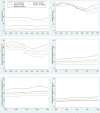Monthly Trends in Access to Care and Mental Health Services by Household Income Level During the COVID-19 Pandemic, United States, April: December 2020
- PMID: 34909547
- PMCID: PMC8665787
- DOI: 10.1089/heq.2021.0036
Monthly Trends in Access to Care and Mental Health Services by Household Income Level During the COVID-19 Pandemic, United States, April: December 2020
Abstract
Purpose: Since the start of the coronavirus disease 2019 (COVID-19) pandemic in March 2020, ∼40% of U.S. adults have experienced delayed medical care. Rates of uninsurance, delayed care, and utilization of mental health services during the course of the pandemic have not been analyzed in detail. We examined monthly trends and disparities in access to care by household income levels in the United States. Methods: Using Census Bureau's nationally representative pooled 2020 Household Pulse Survey from April to December, 2020 (N=778,819), logistic regression models were used to analyze trends and inequalities in various access to care measures. Results: During the COVID-19 pandemic, the odds of being uninsured, having a delayed medical care due to pandemic, delayed care of something other than COVID-19, or delayed mental health care were, respectively, 5.54, 1.50, 1.85, and 2.18 times higher for adults with income <$25,000, compared to those with incomes ≥$200,000, controlling for age, sex, race/ethnicity, education, marital status, housing tenure, region of residence, and survey month. Income inequities in mental health care widened over the course of the pandemic, while the probability of delayed mental health care increased for all income groups. Although the odds of taking prescription medication for mental health were higher for low-income adults, the odds of receiving mental health services were generally lower for lower income adults, controlling for all covariates. Conclusion: In light of our findings on persistent health care inequities during the pandemic, increased policy efforts are needed to improve access to care in low-income populations as an equitable COVID-19 recovery response.
Keywords: COVID-19; access to care; delayed medical care due to pandemic; income inequalities; mental health services; trend.
© Hyunjung Lee and Gopal K. Singh 2021; Published by Mary Ann Liebert, Inc.
Conflict of interest statement
No competing financial interests exist.
Figures

Similar articles
-
Monthly trends in self-reported health status and depression by race/ethnicity and socioeconomic status during the COVID-19 Pandemic, United States, April 2020 - May 2021.Ann Epidemiol. 2021 Nov;63:52-62. doi: 10.1016/j.annepidem.2021.07.014. Epub 2021 Aug 4. Ann Epidemiol. 2021. PMID: 34358622 Free PMC article.
-
Marked Disparities in COVID-19 Vaccination among US Children and Adolescents by Racial/Ethnic, Socioeconomic, Geographic, and Health Characteristics, United States, December 2021 - April 2022.Int J MCH AIDS. 2022;11(2):e598. doi: 10.21106/ijma.598. Epub 2022 Dec 7. Int J MCH AIDS. 2022. PMID: 36506109 Free PMC article.
-
Association of Human Mobility Restrictions and Race/Ethnicity-Based, Sex-Based, and Income-Based Factors With Inequities in Well-being During the COVID-19 Pandemic in the United States.JAMA Netw Open. 2021 Apr 1;4(4):e217373. doi: 10.1001/jamanetworkopen.2021.7373. JAMA Netw Open. 2021. PMID: 33825836 Free PMC article.
-
How do state policies shape experiences of household income shocks and mental health during the COVID-19 pandemic?Soc Sci Med. 2021 Jan;269:113557. doi: 10.1016/j.socscimed.2020.113557. Epub 2020 Nov 29. Soc Sci Med. 2021. PMID: 33308909 Free PMC article.
-
Updated National Survey Trends in Telehealth Utilization and Modality (2021-2022): Issue Brief [Internet].Washington (DC): Office of the Assistant Secretary for Planning and Evaluation (ASPE); 2023 Apr 19. Report No.: HP-2023-09. Washington (DC): Office of the Assistant Secretary for Planning and Evaluation (ASPE); 2023 Apr 19. Report No.: HP-2023-09. PMID: 38913813 Free Books & Documents. Review.
Cited by
-
Mobile Acceptance and Commitment Therapy With Distressed First-Generation College Students: Microrandomized Trial.JMIR Ment Health. 2023 May 15;10:e43065. doi: 10.2196/43065. JMIR Ment Health. 2023. PMID: 37184896 Free PMC article.
-
Mental health among rural Latino immigrants during the COVID-19 pandemic.SSM Ment Health. 2023 Dec;3:100177. doi: 10.1016/j.ssmmh.2022.100177. Epub 2022 Dec 17. SSM Ment Health. 2023. PMID: 36570024 Free PMC article.
-
Association between Poverty and Refraining from Seeking Medical Care during the COVID-19 Pandemic in Japan: A Prospective Cohort Study.Int J Environ Res Public Health. 2023 Feb 2;20(3):2682. doi: 10.3390/ijerph20032682. Int J Environ Res Public Health. 2023. PMID: 36768046 Free PMC article.
-
Child Anxiety and Depression During the COVID-19 Pandemic and Unmet Mental Health Care Needs.Child Psychiatry Hum Dev. 2024 Feb 13. doi: 10.1007/s10578-024-01668-4. Online ahead of print. Child Psychiatry Hum Dev. 2024. PMID: 38351248
-
Navigating the divide: inequalities in household experiences of healthcare disruption in Latin American and the Caribbean countries amidst COVID-19.Int J Equity Health. 2024 Nov 30;23(1):259. doi: 10.1186/s12939-024-02337-7. Int J Equity Health. 2024. PMID: 39616340 Free PMC article.
References
-
- Findling MG, Blendon RJ, Benson JM. Delayed care with harmful health consequences—reported experiences from national surveys during coronavirus disease 2019. JAMA Health Forum. Am Med Assoc. 2020;1:e201463–e201463. - PubMed
-
- Hamel L, Kearney A, Kirzinger A, et al. . KFF Health Tracking Poll–June 2020. San Francisco, CA: Kaiser Family Foundation. 2020. Available at https://www.courts.ca.gov/opinions/links/B298914S-LINK1.PDF Accessed February 4, 2021.
-
- The Robert Wood Johnson Foundation. The Impact of Coronavirus on Households Across America. Princeton, NJ. 2020. Available at https://www.rwjf.org/en/library/research/2020/09/the-impact-of-coronavir... Accessed February 8, 2021.
-
- Centers for Medicare & Medicaid Services. Medicare Current Beneficiary Survey COVID-19 Data Snapshot—Summer 2020. Baltimore, MD. 2020. Available at https://www.cms.gov/research-statistics-data-and-systemsresearchmcbsdata... Accessed February 14, 2021.
LinkOut - more resources
Full Text Sources
Miscellaneous
